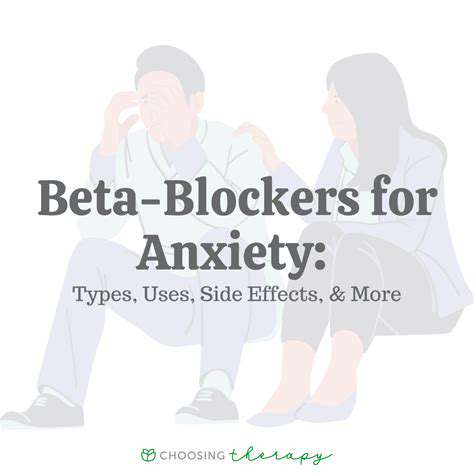How Beta Blockers Can Improve Heart Health and Manage Anxiety
The Role of Beta Blockers in Cardiovascular Health

The Mechanism of Action of Beta Blockers
Beta blockers primarily work by blocking the effects of the hormone epinephrine, also known as adrenaline. This leads to a decrease in heart rate and blood pressure, which is essential for individuals with cardiovascular issues. By reducing the heart's workload, beta blockers can significantly lower the risk of heart-related complications.
They achieve this by binding to beta-adrenergic receptors found in the heart, lungs, and various blood vessels. This binding prevents adrenaline from eliciting its usual effects, such as increasing heart rate and blood vessel constriction.
There are several types of beta blockers, including non-selective and selective options, each having different sites of action and effects on the body. Non-selective beta blockers can impact both beta-1 and beta-2 receptors, while selective ones primarily target beta-1 receptors in the heart.
The choice of which beta blocker to use depends on the specific cardiovascular condition being treated and the patient's overall health profile. Choosing the right beta blocker can lead to improved patient outcomes and better management of heart health.
In addition to their primary role, beta blockers can have secondary benefits, including stabilization of heart rhythms and limitations on the frequency of angina attacks. This versatility makes them crucial in treating a variety of heart conditions.
Benefits of Beta Blockers for Heart Health
Beta blockers are widely used in the management of hypertension, providing a straightforward method to keep blood pressure levels in check. Managing elevated blood pressure is critical as it reduces the risk of heart attack and stroke, two leading causes of death globally.
They are also beneficial for patients recovering from heart attacks, helping to prevent further incidents by reducing myocardial oxygen demand. This is crucial in the healing process and contributes to long-term health benefits.
Heart failure patients may also find relief with beta blocker therapy, as these medications can help improve heart function over time and enhance quality of life. Consistent use of beta blockers can lead to substantial improvements in symptoms and overall prognosis.
Further, beta blockers are effective in treating arrhythmias, or irregular heartbeats. By stabilizing the heart's electrical activity, they minimize the risk of complications associated with these conditions.
In summary, beta blockers can lead to significant improvements in heart health through reductions in blood pressure, stabilization of heart rhythms, and protection against future cardiac events. Their comprehensive benefits solidify their role in cardiovascular care.
Beta Blockers and Anxiety Management
Beyond their cardiovascular benefits, beta blockers are increasingly recognized for their effectiveness in managing anxiety symptoms, particularly in performance anxiety and social situations. These medications help alleviate physical symptoms associated with anxiety, such as rapid heartbeat and trembling.
By mitigating adrenaline's effects, beta blockers can provide individuals with a greater sense of calm during stressful situations. This can be particularly useful for public speakers, performers, or anyone facing high-pressure scenarios.
Many studies have suggested a positive relationship between beta blocker use and reduced anxiety levels, although they are not considered a first-line treatment. Instead, they can be a complementary option alongside therapy and other medications.
It's important to note that while beta blockers can help with physical symptoms of anxiety, they do not address the underlying psychological aspects. Therefore, they should ideally be used as part of a comprehensive treatment plan.
Overall, the incorporation of beta blockers into anxiety management allows individuals to confront their fears and perform at their best. For many, this dual benefit of heart health and anxiety relief is life-changing.
Potential Side Effects and Considerations
While beta blockers are generally well-tolerated, they can have side effects that patients should be aware of. Common side effects include fatigue, dizziness, and cold extremities, which can sometimes impact daily activities.
Some individuals may experience sleep disturbances or vivid dreams, which can be disconcerting. It's crucial for patients to monitor their responses to the medication and discuss any troublesome effects with their healthcare provider.
Patients with asthma or chronic obstructive pulmonary disease (COPD) should use beta blockers cautiously, as non-selective options may exacerbate respiratory issues. This potential risk emphasizes the importance of personalized treatment approaches when prescribing beta blockers.
It's also essential to consider the potential for withdrawal symptoms when discontinuing beta blockers, as abrupt cessation can lead to heightened heart rates and increased blood pressure. As a result, doctors often recommend tapering off the medication gradually.
In summary, while beta blockers offer numerous benefits for cardiovascular health and anxiety management, patients must remain informed about potential side effects and collaborate closely with their healthcare provider to reassess their treatment plan when necessary.
Future Directions in Beta Blocker Research
The landscape of beta blocker research is evolving, with ongoing studies aiming to clarify their roles in various health conditions beyond heart disease and anxiety. Emerging evidence indicates that beta blockers may provide benefits in treating certain types of cancers and inflammatory diseases.
Research is also focused on understanding the long-term effects of beta blocker use in different populations, which could lead to optimized treatment protocols and enhanced patient outcomes. Such advancements may reshape our understanding of these medications and their full therapeutic potential.
As healthcare providers become more aware of the multifaceted benefits and risks associated with beta blockers, there is a push for personalized medicine approaches tailored to individual patient needs. This could involve genetic testing to determine the best type of beta blocker for each patient.
Moreover, as mental health awareness grows, further investigations into the efficacy of beta blockers for anxiety and other related conditions are anticipated. This could lead to new treatment guidelines that recognize their value in mental health care.
Ultimately, ongoing research will play a crucial role in refining the use of beta blockers, ensuring they continue to be a valuable asset in both cardiovascular care and anxiety management.
Managing Anxiety with Beta Blockers

Understanding How Beta Blockers Work
Beta blockers are a class of medications primarily used to manage heart conditions, but they also play a role in anxiety management. They work by blocking the action of certain hormones, particularly epinephrine, on beta-adrenergic receptors. This results in a decrease in heart rate and blood pressure, which can help alleviate the physical symptoms of anxiety.
By reducing the heart rate, people experiencing anxiety can feel more at ease, as they may notice fewer of the racing heartbeat sensations associated with panic attacks. In addition to managing heart-related issues, beta blockers can help individuals gain control over their bodily responses in high-stress situations. This effectiveness has made them a popular off-label choice for those dealing with anxiety.
Another key aspect of how beta blockers assist in anxiety management is their ability to mitigate the physiological responses to stress. This can lead to a more relaxed state of mind during anxiety-provoking situations, such as public speaking or other performance-related activities. Thus, beta blockers can be particularly beneficial for individuals who suffer from performance anxiety.
Considerations and Side Effects of Beta Blockers
While beta blockers can be effective in managing anxiety and heart health, it's essential to understand the potential side effects associated with their use. Common side effects can include fatigue, dizziness, and cold hands or feet. These side effects can significantly impact a person's daily life, making it important to monitor how one feels while on the medication.
Moreover, not everyone is a suitable candidate for beta blockers. Individuals with asthma or certain heart conditions may face increased risks when taking these medications. It is crucial to have a thorough discussion with a healthcare provider to determine if beta blockers are a safe option for managing anxiety and heart health.
Finally, the decision to use beta blockers should always be part of a comprehensive treatment plan. Combining them with therapy or lifestyle changes can provide the best outcomes in managing anxiety. Educating oneself about the medication and its effects is an essential step toward making informed health decisions.
Key Considerations and Potential Side Effects
Understanding the Role of Beta Blockers
Beta blockers are a class of medications primarily used to manage various cardiovascular conditions. They work by blocking the effects of adrenaline on beta-adrenergic receptors, which leads to a decrease in heart rate, blood pressure, and overall strain on the heart. This mechanism makes them particularly effective for individuals with heart issues, such as arrhythmias and hypertension.
In addition to their cardiovascular benefits, beta blockers are also prescribed for conditions such as generalized anxiety disorder and social anxiety. By dampening the body's fight-or-flight response, they can help patients manage physical symptoms like rapid heartbeat and tremors during stressful situations.
Key Precautions to Consider
While beta blockers offer numerous health benefits, there are several important precautions to keep in mind. Patients with certain pre-existing conditions, such as asthma or chronic obstructive pulmonary disease (COPD), should exercise caution when using these medications, as beta blockers can potentially aggravate respiratory symptoms. Additionally, individuals with diabetes need to be aware that beta blockers can mask some warning signs of low blood sugar, making self-monitoring more challenging.
Moreover, it is essential for patients to communicate with their healthcare provider about any other medications they are taking to avoid potential drug interactions. Regular monitoring by a healthcare professional can help ensure that the dosage is appropriate and that no adverse effects are being experienced.
Potential Side Effects and Management Strategies
Like any medication, beta blockers can lead to side effects in some individuals. Commonly reported side effects include fatigue, cold hands and feet, and a slow heartbeat. In some cases, patients may experience睡眠 disturbances or mood changes. Understanding these potential side effects is crucial for any patient considering beta blocker therapy.
To manage side effects effectively, it is important for patients to maintain open communication with their healthcare provider. If side effects become bothersome or impact daily activities, alternative treatments or adjustments to the medication regimen may be considered. Healthcare providers can also suggest lifestyle changes that can enhance the effectiveness of beta blockers while minimizing unwanted effects.